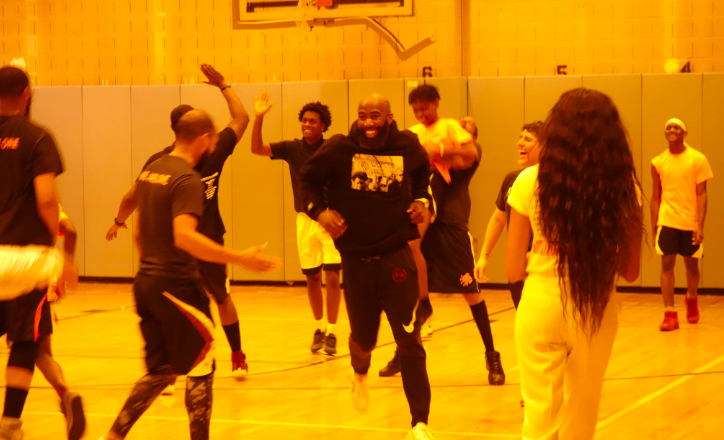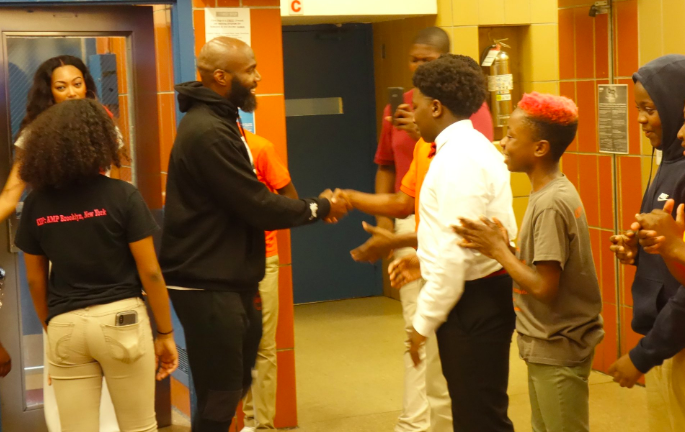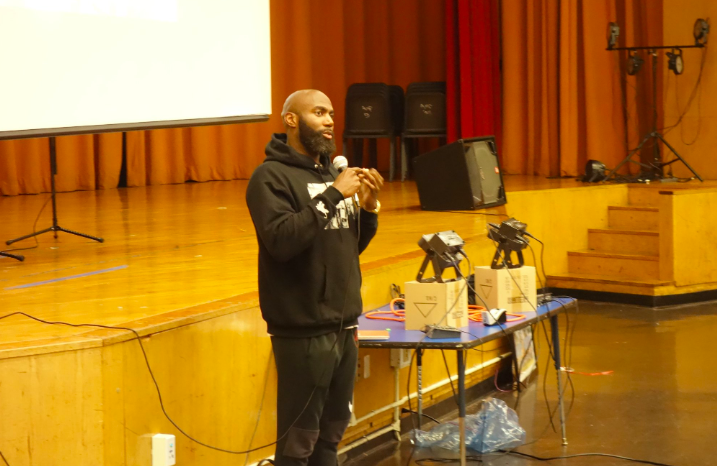Crown Heights Middle Schoolers Get Visit from NFL Star


CROWN HEIGHTS—Students at a middle school in Crown Heights got a treat Monday, when Philadelphia Eagles safety and two-time Super Bowl champion Malcolm Jenkins paid a visit.
The Eagles defensive star dispensed life advice as well as political insight to students, coached—and even played a little—touch football in the school’s gym and participated alongside students in a discussion on the newly released Central Park Five documentary, “When They See Us.”
Jenkins arrived at the Crown Heights charter school, KIPP AMP Middle School, around 1 p.m., after reporting to the Eagles facility earlier in the day, wearing a Women’s Liberation sweatshirt, and, like all other visitors, signed in at the front desk, and was subsequently warmly greeted the students who swarmed him at the door.
The 31-year-old New Jersey native, who is one of the most politically outspoken players in the NFL, told the mostly black student body that he feels it’s his responsibility to use his platform to speak about social justice.
“I think that everybody’s responsible to use whatever you can to fight for our people,” he told the students in the auditorium.
Indeed, Jenkins is among the several players who in 2016 began taking a knee during the National Anthem, and last season raised his fist during it, wrote an op-ed in the Washington Post on the NFL player protests, and heads the youth-focused Malcolm Jenkins Foundation.
He also gave the students broader, apolitical advice, telling them to embrace their own individuality.

“Right now in society, with social media, we want to be like everybody else and we lose track of who we are. We never get to learn who we are,” he said. “Y’all got to understand that each and every one of y’all are made uniquely and special, and you have a purpose.”
During the documentary discussion, which followed the student-versus-teacher touch football game, Jenkins said visual representations of injustices often spark societal awakenings among a wide swath of the population that is often forced to reckon with hardships black people face.
“If you look historically at the things that move culture, if you look at Emmet Till, the reason Emmett Till was so important is because that was the first time there were images all over magazines across the country,” he explained. “It wasn’t until they started seeing those images that people started to put two and two together.”
He added, “People recognize that these aren’t just tall tales that we’ve been complaining about in our communities for centuries, this is an age-old issue that started with the day one of this country until now.”
In addition, Jenkins instructed the students to be aware of their civil rights, given the history of police tactics toward young black people in the United States.
“You are the most vulnerable people in this country,” he said.
But knowing your rights isn’t enough, said Jenkins.
“It’s more powerful for you guys to demand from adults who make decisions ‘This is not acceptable for us,’” he said. “I don’t think we talk about that enough. How to go about changing laws, how to lobby, how to show up, how to write letters to elected officials, even though you guys don’t have a vote, you guys, especially with social media, the ability to draw attention to things, and nobody wants to be a politician who bypasses a bunch of kids when they want to be heard. That’s a powerful thing.”

Students at KIPP AMP Middle School told Bklyner they were inspired by the visit, saying they look at Jenkins as a role model.
“When I grow older, I would like to do the same thing he does,” said Jahmari, an eighth-grader from Crown Heights. “Not the football thing, but to talk about the problems we have in America today.”
What did he learn from the visit?
“My biggest takeaway is to always be aware,” he explained. “Always be educated on your civil rights.”
Amina, an eighth-grader from Canarsie, said she appreciated the visit because it showed that “someone who has media power and has an actual voice is listening to the things I have to say and is taking what I have to say into account.”
“Maclolm brought up the idea of where does it go from here, and what laws are we going to change, because we can know our rights so much and we can be socially aware, but it’s like, ‘Where does it go after that?’” she continued. “So [Jenkins was] planting a seed in everyone’s head that we can be the change.”




